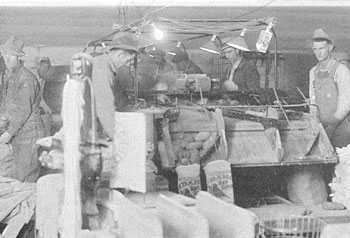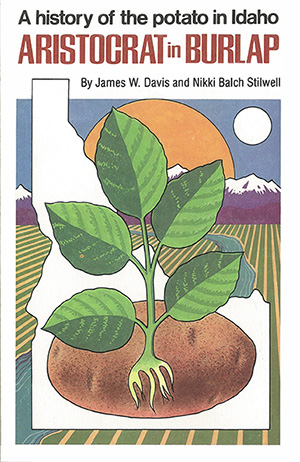 Most employees were men in early shipping operations.
Most employees were men in early shipping operations.
The establishment, growth, and evolution of the potato-shipping segment of the industry in Idaho are the history of changing technology and changing methods of merchandising. In the very-early days, growers sorted and packed their own crops. The work was usually done in the potato cellar and was primarily a family operation. Grading standards were almost nonexistent, and the sorting process was largely to separate smaller potatoes, which would be the seed for next year's crop along with clods of dirt, field stones, and trash that were completely unacceptable as food.
The early sorting operations were not mechanized. A hand-powered shaker sorter was employed, and the potatoes were "dry" packed, which meant they were not washed. The person who eventually became a potato shipper evolved through the invention and employment of electrically powered sorting tables. This early equipment was not very complicated, but it did involve a moving belt on a table that carried the potatoes by people standing on either side and enabled them to remove defective tubers and to make selection according to size if so desired.
When a grower invested his money in a portable sorting table, it was customary to move it from cellar to cellar and work for his neighbors after his own crop had been shipped. It was also customary for the grower who owned a sorting table to have a crew working for him so that he could handle the entire operation, perhaps utilizing the labor of the grower he was working with or a member or two of his family in addition to the regular crew. These growers who sorted and packed potatoes for others tended to become specialists and so developed the evolution of the country shipper.
When it was necessary to use horses as a means of transporting the potatoes to the railroad, hauling distances had to be very short. If a farm was located four or five miles from the town where the potatoes could be loaded on a railroad car, it was usually possible for the teamster to make only two trips per day. As cellars to store potatoes were built along the railroads in Idaho's small towns, it was only natural that sorting facilities would be installed at these potato warehouses so that shipping could continue during the cold months of the winter replacing the family operation in the grower's cellar.


 Most employees were men in early shipping operations.
Most employees were men in early shipping operations.